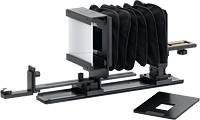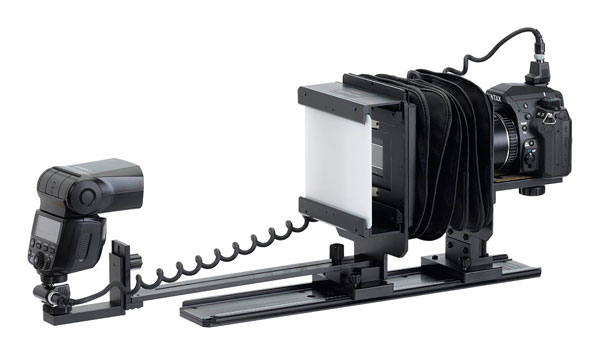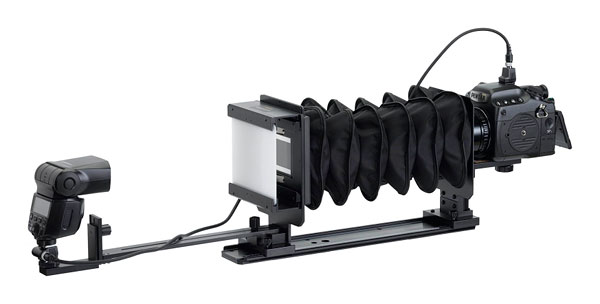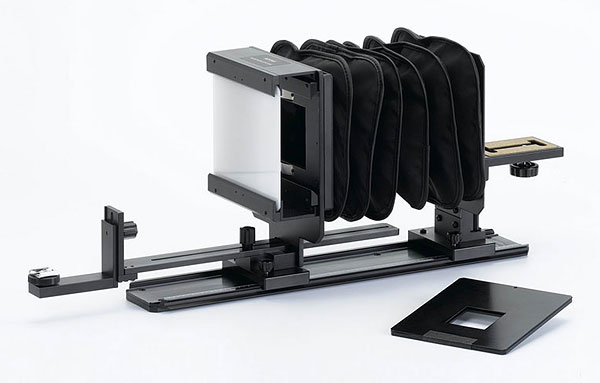Pentax Film Duplicator helps you scan 35mm and medium-format film quicker
posted Monday, April 21, 2014 at 2:38 PM EDT

Back at the CP+ tradeshow in Japan last February, Ricoh announced quite a range of new photo gear for its Pentax brand, but perhaps the most interesting for film photographers who haven't transitioned their old photos to digital was the Pentax Film Duplicator. Now, the company has provided a release date for this interesting accessory, and the Japanese media has supplied an expected price.
The Pentax Film Duplicator allows you to do the job of digitizing your film using your existing camera and flash. Your camera and lens sit at one end of the duplicator, and your flash -- triggered either wirelessly or via a sync cord -- sits at the other. In between are a bellows, film mount, and a diffusers that provides even illumination from your direct flash. The point of the bellows is that it allows you to accommodate a variety of camera and lens pairings, adjusting to match the minimum focus distance of the lens, thereby putting as many pixels as possible onto each film frame.

Why would you want to use your existing camera, rather than a dedicated scanner? Well for one thing, this provides you with a degree of future-proofing. There are no electronics in the duplicator to fail, and as cameras improve and you upgrade to newer models, so to does your scanning capability. There's also potentially quite a big difference in speed: Film scanners typically work line-by-line, so it takes quite some time to scan each image at high resolution. By contrast, with the digital camera you already own, you can digitize one or more frames of film near-instantly with a press of the shutter button, saving you a lot of waiting between preparing frames.
If you're scanning tens, hundreds, or even thousands of frames, that could make a big difference to the scope of your project. (And hence, make it more likely you'll take the time to digitize your film in the first place. Let's face it -- if you've not digitized yet after more than a decade of digital photography, you've likely been putting it off for a reason.) There is, of course, a downside. Not only will you need to clean your film carefully before digitizing it, you'll also have to manually retouch dust and scratches, something that some scanners will do automatically for you. That extra work will to some extent offset the time saved on scanning in the first place. How much time you'll save thus depends on how well your film has been looked after, and how picky you are about dust and scratches appearing in the final result.

The Pentax Film Duplicator is compatible with mounted and unmounted film formats up to a maximum of 6x9 medium format, or 60 x 90mm in size. For positive film, simply mount, focus, set your aperture to provide sufficient depth of field if the film isn't perfectly flat, and you're set to go. If digitizing negatives, you'll also need to convert your digitized frames to positives. You can, of course, use the negative function provided in Photoshop if you're not too picky about getting accurate color. Much better results are available with film-specific conversion software such as SilverFast NegaFix or similar, however. Obviously, you'll need to buy that separately.
You'll also need to buy optional holders for all but 35mm mounted film, for which the necessary holder is included in the product bundle. Optional holders are available for mounted 645 / 66 film and mounted 67 / 69 film, while sleeves can be bought for unmounted 35mm, 645, and 66 / 67 / 69 film. The sleeves will also require that you purchase a sleeve base mount; a quick shoe base and plate are also available.

Pricing for all of the above has not been officially disclosed by Ricoh, but the base Film Duplicator with 35mm slide holder is reported by Japanese photo site Impress DC Watch to be a rather stiff ¥120,000. (That's the equivalent of US$1,170, at current exchange rates.) The Pentax Film Duplicator is available in Japan from May 2014, and thus far, no plans have been disclosed for sale in other markets.